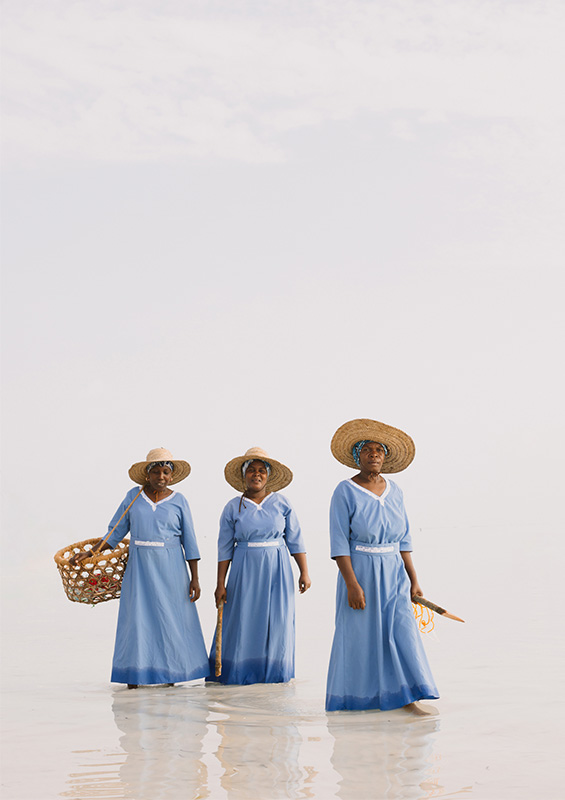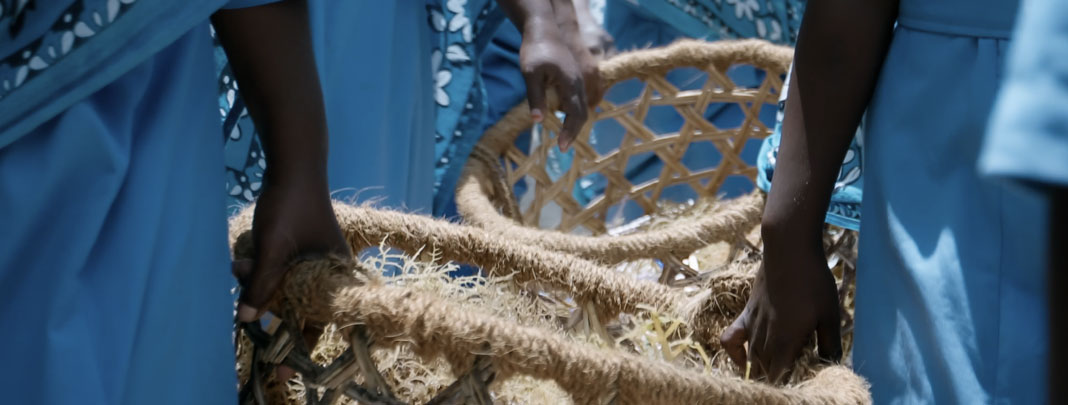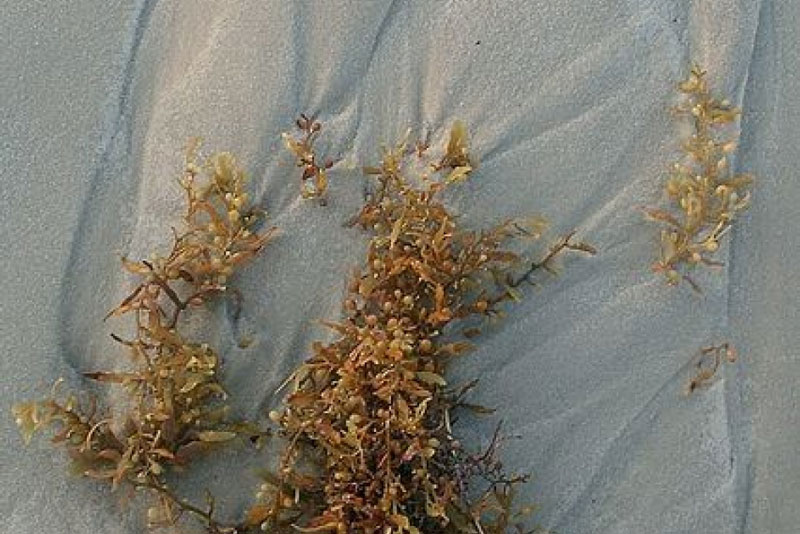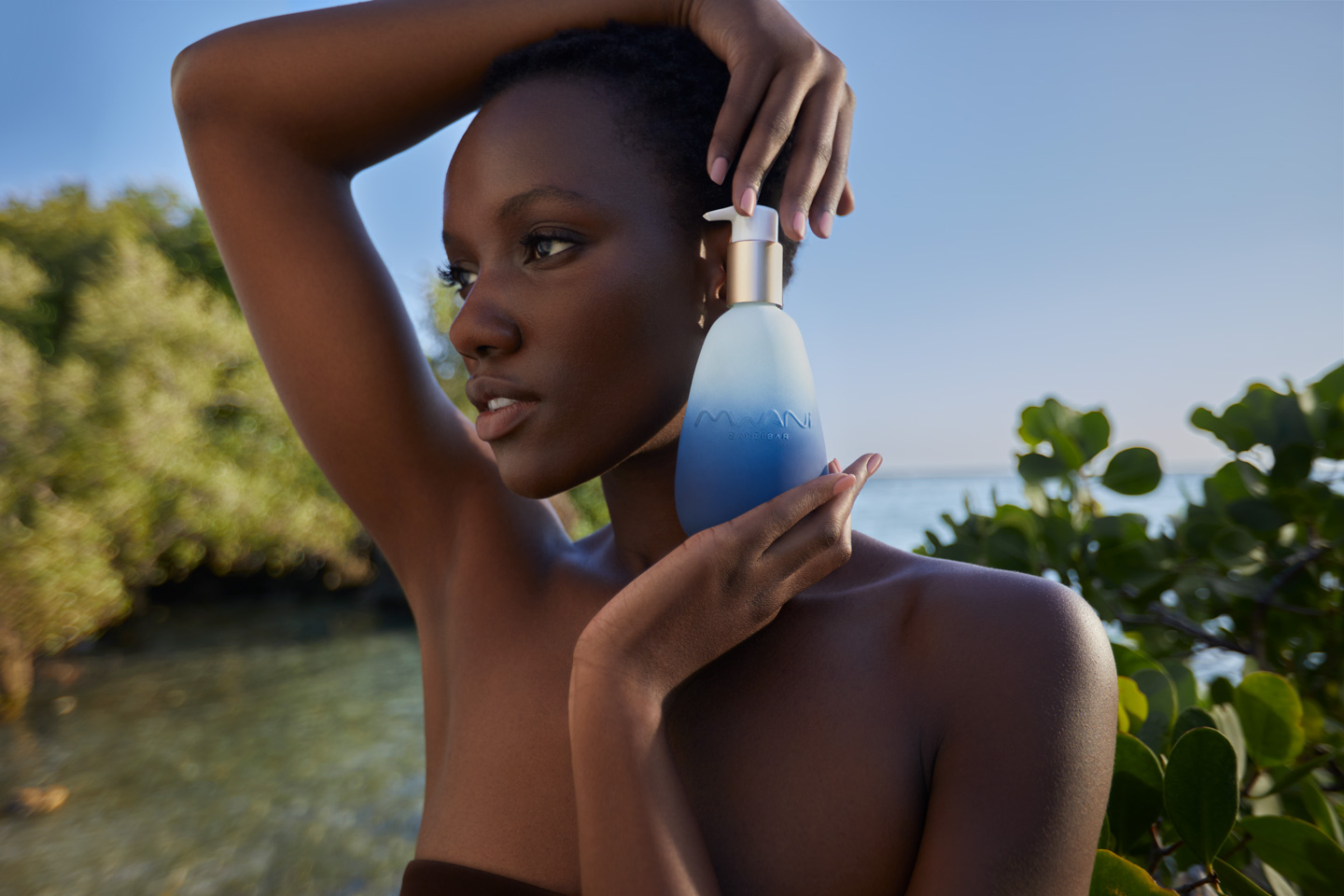We strongly believe that the choices we make matter. Every small ethically-focused step we take as a business encourages innovation and creativity along the entire supply chain, catalyzing new solutions and relationships. We hope you will join us on our journey – with your support, we can move quicker and do more. Together, we can have a big impact.

Zanzibar is known as the spice island. Sitting 80 kilometres off the coast of Tanzania, enveloped by the Indian Ocean, our island is warm year-round with brilliantly turquoise waters and white sand beaches. Like the ocean, Zanzibar’s history and essence has great depths, encapsulating a unique fusion of African, Arab and Indian cultures.
As a developing coastal community, we are vulnerable to the very real threats of climate change and social and economic inequalities. As many as 40% of our young people are unemployed. Tourism, while a welcome source of income, places pressure on our reefs, corals and wildlife, while Zanzibar’s deforestation rates are one of the highest in the world.
Zanzibar is currently at a tipping point. We believe that the island could develop tremendously using models that focus on sustainability, creating a unique identity as a tourist destination and protecting the livelihoods of future generations. We try hard to embody the concept that one can do well and give back generously, creating a virtuous circle where everyone benefits.
Mwani Zanzibar’s status is officially carbon neutral, certified with Climate Partner. However, we know we can never really make up for a carbon footprint, and that paying our way out of the problem will not resolve it.
Our certification is on the understanding that we need to continuously work towards reducing our carbon footprint. It helps us measure our footprint and develop a roadmap towards further reductions. Offsetting is a tool to help us along the journey, not an end in itself. As we scale, we will continue to look for further solutions.
Mwani Zanzibar’s status is officially carbon neutral, certified with Climate Partner. However, we know we can never really make up for a carbon footprint, and that paying our way out of the problem will not resolve it.
Our certification is on the understanding that we need to continuously work towards reducing our carbon footprint. It helps us measure our footprint and develop a roadmap towards further reductions. Offsetting is a tool to help us along the journey, not an end in itself. As we scale, we will continue to look for further solutions.
Seaweed is Zanzibar’s largest source of income after tourism and cloves, accounting for 90% of our country’s marine exports. With limited options for employment, seaweed farming is often the main source of income for women.
As of 2022, our country’s seaweed industry employed over 25,000 seaweed farmers, 80% of whom are women. Yet, the majority of women seaweed farmers are freelance, earning approximately $30 per month, for full-time work, with no healthcare benefits. This is just a fraction of the national minimum wage.
Before we became Mwani Zanzibar, existing as the Seaweed Center & Co of Zanzibar, our farmers have already earned five times the average income of freelance seaweed farmers. As we have grown our international audience, entering international markets, we are able to sell our new collection at higher price points. And in turn, extend our impact on our artisans and suppliers.
That means we are able to multiply the prices we pay our Mamas and suppliers. We have also been able to classify and clinically research additional types of seaweeds and stimulate new projects for the processing of raw materials, all working with local farmers and suppliers, in some cases at 33 times their traditional pay!

Before we became Mwani Zanzibar, existing as the Seaweed Center & Co of Zanzibar, our farmers have earned five times the average income of freelance seaweed farmers. As we have grown our international audience, entering global markets, we are able to sell our new collection at higher price points. And in turn, extend our impact on our artisans and suppliers.
That means we are able to multiply the prices we pay our Mamas and suppliers. We have also been able to classify and clinically research additional types of seaweeds and stimulate new projects for the processing of raw materials, all working with local farmers and suppliers, in some cases at 33 times their traditional pay!
Seaweed is Zanzibar’s largest source of income after tourism and cloves, accounting for 90% of our country’s marine exports. With limited options for employment, seaweed farming is often the main source of income for women.
As of 2022, our country’s seaweed industry employed over 25,000 seaweed farmers, 80% of whom are women. Yet, the majority of women seaweed farmers are freelance, earning approximately $30 per month, for full-time work, with no healthcare benefits. This is just a fraction of the national minimum wage.

We know all our farmers and suppliers by name. They live and work close by, so our relationship is very different to the usual supply chain model. They become friends and colleagues. We understand their challenges, and celebrate their successes.
It’s a concept we call Beyond Fairtrade.
We actively support our farmers to add value to their raw materials, so they can grow their businesses independently of us. That includes sourcing funding opportunities, providing business and technical training, and helping with technical development and quality assurance.


We are extremely proud to have launched our collection with 100% post-consumer recycled glass bottles and 80% post-consumer recycled outer packaging – one of the first beauty companies in the world to do so. With sufficient demand, we may be able to switch to 100% post-consumer recycled dispensers.
Formulating packaging in this way takes time, money and commitment – and it’s not always easy – but it’s important to ensure we have the most planet-friendly packaging possible. Already we have worked extensively with our glass supplier to thin our glass bottles, reducing manufacturing and transport carbon footprints. Our logo is debossed in the glass, eliminating the need for energy and materials for silk screen printing or plastic labelling. Our bottles are coloured with a non-toxic chalk pigment to avoid penetration of UVA and UVB rays. This protects the ingredients inside.
We are extremely proud to have launched our collection with 100% post-consumer recycled glass bottles and 80% post-consumer recycled outer packaging – one of the first beauty companies in the world to do so. With sufficient demand, we may be able to switch to 100% post-consumer recycled dispensers too.
Formulating packaging in this way takes time, money and commitment – and it’s not always easy – but it’s important to ensure we have the most planet-friendly packaging possible. Already we have worked extensively with our glass supplier to thin our glass bottles, reducing manufacturing and transport carbon footprints. Our logo is debossed in the glass, eliminating the need for energy and materials for silk screen printing or plastic labelling. Our bottles are coloured with a non-toxic chalk pigment to avoid penetration of UVA and UVB rays. This protects the ingredients inside.

As much as we’d like to, we can’t do it all at once. The options available in the global market are still scarce and expensive. We are committed to ensuring our product line is not only sustainable but restorative, with several technical trials already underway. One of the quickest ways of getting there is for customers to ‘vote with their wallet’ – making choices that support companies such as ours, so suppliers can respond with innovation and scale.

As much as we’d like to, we can’t do it all at once. The options available in the global market are still scarce and expensive. We are committed to ensuring our product line is not only sustainable but restorative, with several technical trials already underway. One of the quickest ways of getting there is for customers to ‘vote with their wallet’ – making choices that support companies such as ours, so suppliers can respond with innovation and scale.
Mwani Zanzibar was selected for the Cambridge Social Ventures Cohort, run by the Cambridge Centre for Social Innovation. The Centre’s focus is to engage with social innovators and create and support social ventures and projects.



Mwani Zanzibar was proud to win Capgemini’s Blue Challenge in 2022, recognizing our innovative use of seaweed and contribution to the blue economy.

Mwani Zanzibar is a member of the Safe Seaweed Coalition. The Coalition works to establish a seaweed industry that provides safe products, safe working conditions and environmental protection.

Mwani Zanzibar is a certified member of Climate Partner. Climate Partner helps us measure the carbon footprint of our products, define a roadmap to continuously reduce emissions, and offset the remaining emissions by supporting a certified carbon offset project.

Mwani Zanzibar’s aims and objectives are in line with the following UN Global Goals.
















No products in the cart.